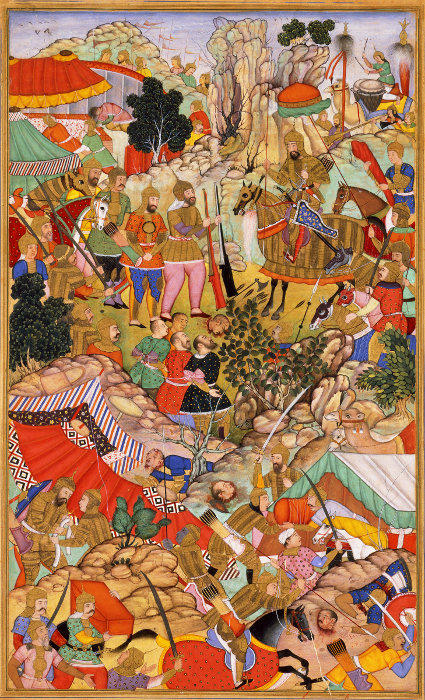Register a SNAP EBT card with Amazon

Create an Amazon Wedding Registry
Tayang Khan presented with the head of the Mongol leader Ong Khan (1204)
from Rashid al-Din's Jami al-Tavarikh, drawn 1596 by Miskin
Although the event portrayed took place in 1204CE in Mongolia, the people wear Moghul costume of 1596CE

A detail of Tayang Khan presented with the head of the Mongol leader Ong Khan
Mongols Conquer the Naiman
When the news was brought to Tayang Khan that someone claiming to be Ong Khan had been slain at the Neikun watercourse, his mother, Gurbesu, said: "Ong Khan was the great Khan of former days. Bring his head here! If it is really he, we will sacrifice to him."
She sent a message to Khorisu, commanding him to cut the head off and bring it in. When it was brought to her, she recognized it as that of Ong Khan. She placed it on a white cloth, and her daughter-in-law carried out the appropriate rites.... A wine-feast was held and stringed instruments were played. Gurbesu, taking up a drinking-bowl, made an offering to the head of Ong Khan.
When the sacrifice was made to it, the head grinned.
"He laughs!" Tayang Khan cried. Overcome by religious awe, he flung the head on the floor and trampled on it until it was mangled beyond recognition.
The great general Kokse'u Sabrakh was present at these ceremonies, and observed them without enthusiasm. It was he who had been the only Naiman general to offer resistance to Temujin and Ong Khan on their expedition against Tayang Khan's brother Buyiruk.
"First of all," he remarked, "you cut off the head of a dead ruler, and then you trample it into the dust. What kind of behaviour is this? Listen to the baying of those dogs: It has an evil sound. The Khan your father, Inancha Bilgei, once said: 'My wife is young, and I, her husband, am old. Only the power of prayer has enabled me to beget my son, this same Tayang. But will my son, born a weakling, be able to guard and hold fast my common and evil-minded people?'
"Now the baying of the dogs seems to announce that some disaster is at hand. The rule of our queen, Gurbesu, is firm; but you, my Khan, Torlukh Tayang, are weak. It is truly said of you that you have no thought for anything but the two activities of hawking and driving game, and no capacity for anything but these."
Tayang Khan was accustomed to the disrespect of his powerful general, but he was stung into making a rash decision.
"There are a few Mongols in the east. From the earliest days this old and great Ong Khan feared them, with their quivers; now they have made war on him and driven him to death. No doubt they would like to be rulers themselves. There are indeed in Heaven two shining lights, the sun and the moon, and both can exist there; but how can there be two rulers here on earth? Let us go and gather those Mongols in."
His mother Gurbesu said: "Why should we start making trouble with them? The Mongols have a bad smell; they wear black clothes. They are far away, out there; let them stay there. Though it is true," she added, "that we could have the daughters of their chieftains brought here; when we had washed their hands and feet, they could milk our cows and sheep for us."
Tayang Khan said: "What is there so terrible about them? Let us go to these Mongols and take away their quivers."
"What big words you are speaking," Kokse'u Sabrakh. "Is Tayang Khan the right man for it? Let us keep the peace."
Despite these warnings, Tayang Khan decided to attack the Mongols. It was a justifiable decision; his armies were stronger, but time was on Temujin's side. Tayang sought allies, sending a messenger to Alakhu Shidigichuri of the Onggut, in the south, the guardians of the ramparts between Qashin and the Khingan. "I am told that there are a few Mongols in the east," he said. "Be my right hand! I will ride against them from here, and we will take their quivers away from them."
Alakhu Shidigichuri's reply was brief: "I cannot be your right hand." He in his turn sent a message to Temujin. "Tayang Khan of the Naiman wants to come and take away your quivers. He sent to me and asked me to be his right hand. I refused. I make you aware of this, so that when he comes your quivers will not be taken away.
When he received Alakhu's message Temujin, having wintered near Guralgu, was holding one of his roundups of game on the camel steppes of Tulkinche'ut, in the east. The beasts had been encircled by the clansmen and warriors; the chieftains were gathered together, about to begin the great hunt.
"What shall we do now?" some of them said to each other. "Our horses are lean at this season."
... The snow had only lately left the steppe; the horses had found nothing to graze on during these recent months. Their ribs stuck out and they lacked strength.
The Khan's youngest brother, Temuga, spoke up....
"How can that serve as an excuse," he said, "that the horses are lean? My horses are quite fat enough. How can we stay sitting here, when we receive a message like that?"
Prince Belgutai spoke....
"If a man allows his quivers to be taken away during his lifetime, what kind of an existence does he have? For a man who is born a man, it is a good enough end to be slain by another man, and lie on the steppe with his quiver and bow beside him. The Naiman make fine speeches, with their many men and their great kingdom. But suppose, having heard their fine speeches, we ride against them, would it be so difficult to take their quivers away from them? We must mount and ride; it is the only thing to do."
Temujin was wholly disposed to agree with these sentiments. He broke off the hunt, set the army in motion, and camped near Ornu'u on the Khalkha. Here he paused for a time while he carried out a swift reorganization of the army. A count was held of the people; they were divided up into thousands, hundreds, and tens, and commanders of these units were appointed. Also at this time he chose his personal bodyguards, the seventy day-guards and eighty night-guards....
Having reorganized the army, he marched away from the mountainside of Ornu'u on the Khalkha, and took the way of war against the Naiman.
The spring of the Year of the Rat 1204 was by now well advanced. During this westward march came the Day of the Red Disc, the sixteenth day of the first moon of summer. On this day, the moon being at the full, the Khan caused the great yak's-tail banner to be consecrated, letting it be sprinkled with fermented mare's milk, with the proper observances.
See also Arik Buka defeats Alghu from Rashid al-Din's Jami al-Tavarikh
Other Mughal Illustrations of Costume & Soldiers


